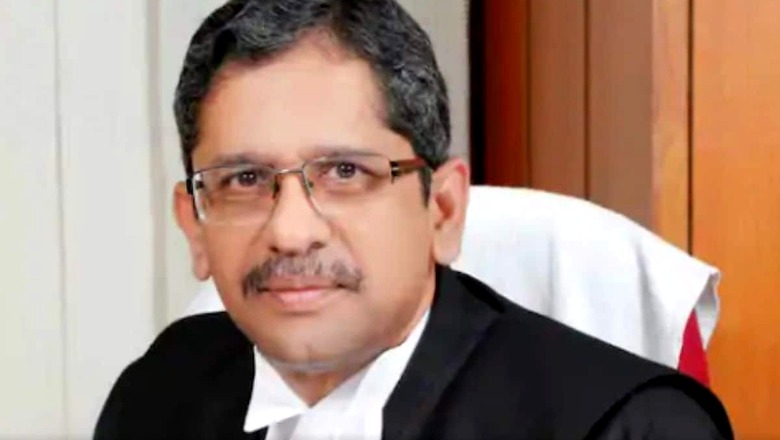
views
Justice NV Ramana has been sworn in as the 48th Chief Justice of India as CJI SA Bobde retired on April 23.
Justice Nuthalapati Venkata Ramana was born in an agrarian family on August 27, 1957, in Ponnavaram village of the State of Andhra Pradesh.
He was enrolled as an Advocate at the Bar on February 10, 1983 was appointed as permanent Judge of the Andhra Pradesh High Court on June 27, 2000 and also functioned as Acting Chief Justice of Andhra Pradesh High Court from. March 10, 2013 to May 20, 2013.
Justice Ramana was elevated as the Chief Justice of Delhi High Court from September 2, 2013 and further elevated as Judge, Supreme Court of India from February 17, 2104.
He has a keen interest in philosophy and literature besides law.
Here are landmark judgments he has been a part of:
– A Supreme Court bench comprising of Justices NV Ramana and Surya Kant in January this year said the value of a woman’s work at home was no less than that of her office-going husband. Justice Ramana expanded the idea first espoused by the SC in Lata Wadhwa case in 2001 when it had dealt with the issue of compensation for victims of a fire during a function and had ruled that it should be granted to housewives on the basis of services rendered by them in the house.
– Md. Anwar v. State of NCT of Delhi, 2020: The 3-judge bench of NV Ramana, SA Nazeer and Surya Kant, held that in order to successfully claim defence of mental unsoundness under Section 84 of IPC, the accused must show by preponderance of probabilities that he/she suffered from a serious-enough mental disease or infirmity which would affect the individual’s ability to distinguish right from wrong. “Mere production of photocopy of an OPD card and statement of mother on affidavit have little, if any, evidentiary value.”
– Anuradha Bhasin v. Union of India, 2020: A 3-judge bench of NV Ramana, R Subhash Reddy and BR Gavai, asked the Jammu & Kashmir administration to review all orders imposing curbs on telecom and internet services in the state in a week and put them in public domain.
– Foundations for Media Professionals v. Union Territory of Jammu and Kashmir, 2020: A 3-judge bench of NV Ramana, R. Subhash Reddy and BR Gavai, constituted a three-member committee to look into demand for allowing 4G mobile internet in the union territory of Jammu and Kashmir.
– Central Public Information Officer v. Subhash Chandra Agarwal, 2019: The 5-judge constitution Bench of Ranjan Gogoi, NV Ramana, DY Chandrachud, Deepak Gupta and Sanjiv Khanna, held that the office of the Chief Justice of India comes under the purview of the Right to Information.
– Roger Mathew v. South India Bank Ltd., 2019: A 5-judge Constitution Bench of Ranjan Gogoi, NV Ramana, DY Chandrachud, Deepak Gupta and Sanjiv Khanna, upheld the validity of Section 184 of the Finance Act, 2017 and held that the said Section does not suffer from excessive delegation of legislative functions. The Court struck down the Tribunal, Appellate Tribunal and other Authorities (Qualifications, Experience and other Conditions of Service of Members) Rules, 2017, made under Section 184 of the Finance Act, 2017, for being contrary to the parent enactment and the principles envisaged in the Constitution.
– Jindal Stainless Ltd v. State of Haryana, 2017: A 9-judge bench, by 7:2 majority, upheld the validity of the entry tax imposed by the States on goods imported from other States. T.S. Thakur, A.K. Sikri, S.A. Bobde, Shiva Kirti Singh, N.V. Ramana, R. Banumathi and A.M. Khanwilkar, JJ, giving the majority view said that States are well within their right to design their fiscal legislations.
– Nabam Rebia, and Bamang Felix v. Deputy Speaker, 2016: A 5-judge constitutional bench of Jagdish Singh Khehar, Dipak Misra, Madan B. Lokur, Pinaki Chandra Ghose and N.V.Ramana quashed the order of the Governor, preponing the 6th session of the Arunachal Pradesh Legislative Assembly by a month without consulting the Chief Minister, Council of Ministers or the Speaker, on account of being violative of Article 163 read with Article 174 of the Constitution of India.
– Adi Saiva Sivachariyargal Nala Sangam v. State of Tamil Nadu, 2016: The bench held that the appointment of Archakas in temples will have to be made in accordance with the Agamas, subject to their due identification as well as their conformity with constitutional mandates and principles. Exclusion or appointment as Archakas would not violate Article 14 only so long it is not based on criteria of caste, birth or any other constitutionally unacceptable parameter.
Read all the Latest News, Breaking News and Coronavirus News here. Follow us on Facebook, Twitter and Telegram.




















Comments
0 comment